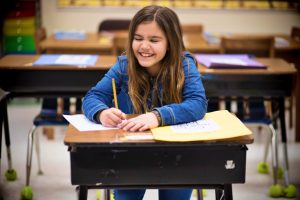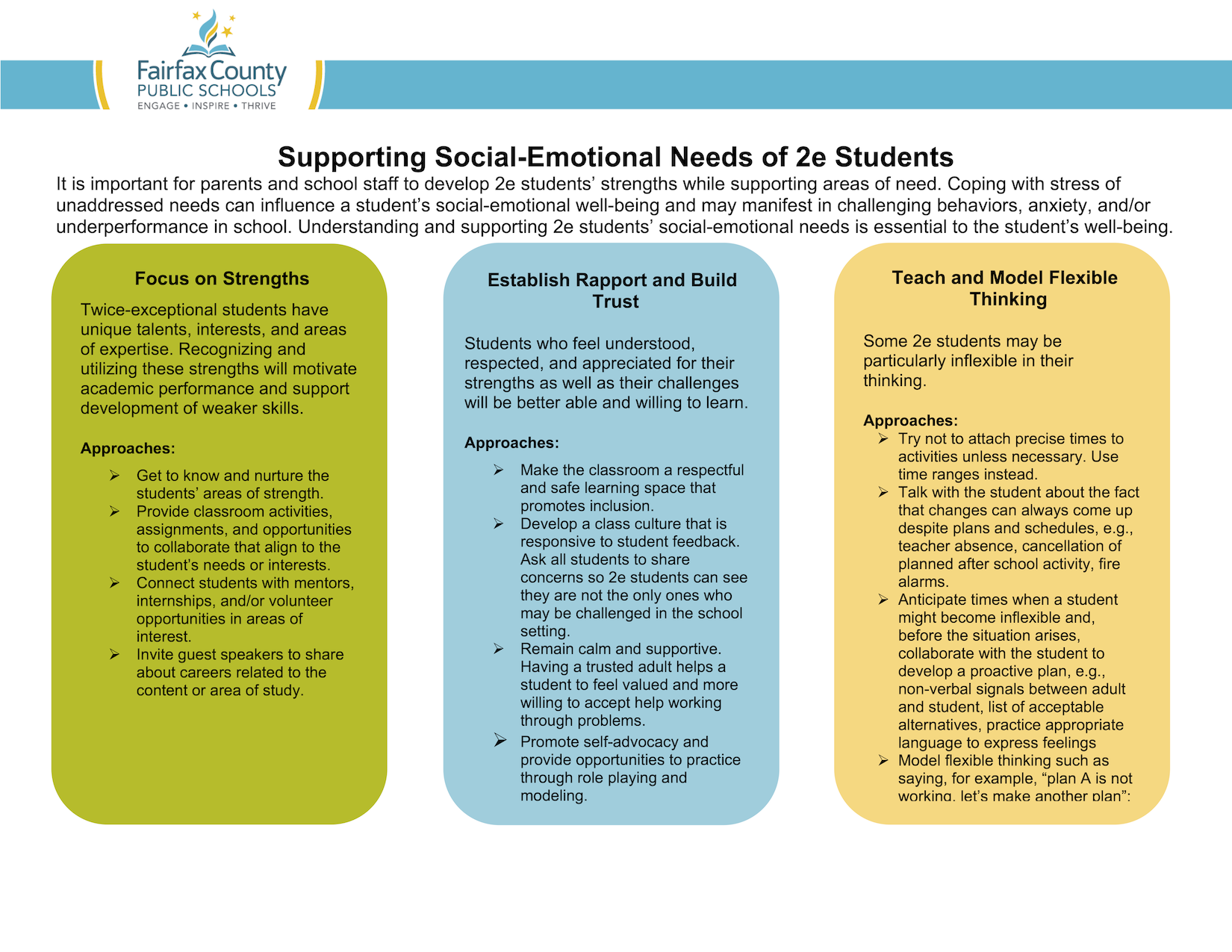Supporting the Social-Emotional Needs of 2e Students [downloadable]
 Understanding and supporting a 2e students’ social-emotional needs is essential to their well-being. It is important for parents and school staff to develop 2e students’ strengths while supporting areas of need.
Understanding and supporting a 2e students’ social-emotional needs is essential to their well-being. It is important for parents and school staff to develop 2e students’ strengths while supporting areas of need.
Coping with stress of unaddressed needs can influence a student’s social-emotional well-being and may manifest in challenging behaviors, anxiety, and/or underperformance in school.
Focus on Strengths
Twice-exceptional students have unique talents, interests, and areas of expertise. Recognizing and utilizing these strengths will motivate academic performance and support development of weaker skills.
Approaches
- Get to know and nurture the students’ areas of strength.
- Provide classroom activities, assignments, and opportunities to collaborate that align to the student’s needs or interests.
- Connect students with mentors, internships, and/or volunteer opportunities in areas of interest.
- Invite guest speakers to share about careers related to the content or area of study.
Establish Rapport and Build Trust
Students who feel understood, respected, and appreciated for their strengths as well as their challenges will be better able and willing to learn.
Approaches
- Make the classroom a respectful and safe learning space that promotes inclusion.
- Develop a class culture that is responsive to student feedback. Ask all students to share concerns so 2e students can see they are not the only ones who may be challenged in the school setting.
- Remain calm and supportive. Having a trusted adult helps a student to feel valued and more willing to accept help working through problems.
- Promote self-advocacy and provide opportunities to practice through role playing and modeling.
Teach and Model Flexible Thinking
Some 2e students may be particularly inflexible in their thinking.
Approaches
- Try not to attach precise times to activities unless necessary. Use time ranges instead.
- Talk with the student about the fact that changes can always come up despite plans and schedules, e.g., teacher absence, cancellation of planned after school activity, fire alarms.
- Anticipate times when a student might become inflexible and, before the situation arises, collaborate with the student to develop a proactive plan, e.g., non-verbal signals between adult and student, list of acceptable alternatives, practice appropriate language to express feelings.
- Model flexible thinking such as saying, for example, “plan A is not working, let’s make another plan.”
Address Anxiety
Some 2e students have a level of anxiety that interferes with their school success. The sources of anxiety are highly individual to each student and may present as inattentiveness, disruptive or defiant behavior, or underachievement; however, the behaviors may be a result of a disability, identified or unidentified. Unaddressed anxiety may result in physical complaints, poor attendance, or school refusal.
Approaches
- Plan for predictable stressors, such as exams or transitions between schools.
- Allow the student to walk through a school, meet teachers and case managers, ask questions, and discuss concerns in advance of beginning a new school.
- Listen to and validate the student’s concerns.
- Teach self-awareness and coping skills (e.g., deep or slow breathing, counting, or other relaxation strategies).
Foster a Growth Mindset
A growth mindset is the belief that intelligence is not fixed or something one is born with, rather something that can be developed (Dweck, 2018). Students who are fearful of making mistakes may be at risk for stress, anxiety, and underachievement.
Approaches
- Create a learning environment that encourages risk-taking, creativity, and innovation, for example, find role models in history or in media to help students see that success comes in many forms and follows many paths.
- Allow students to take calculated risks and reframe “failures” as “setbacks” that are part of the learning process for everyone.
- Reinforce the idea that success comes from hard work and gradual improvement rather than innate intelligence or talent.
- Share stories of times you took healthy risks or when something was difficult and how you persisted.
Download a PDF of this resource.

Source: Fairfax County Public Schools | Supporting the Social-Emotional Needs of 2e Students, https://www.fcps.edu/sites/default/files/SupportingSocialEmotionalNeeds.pdf | © 2022 Fairfax County Public Schools, Fairfax County, Virginia
If you have concerns about your child or teen, CHC Care Coordinators can arrange a free 30-minute consultation so you can explore options with an expert. We invite you to call or email us at 650.688.3625 or careteam@chconline.org to set up an initial Parent Consultation appointment. CHC teletherapy services are available now.





